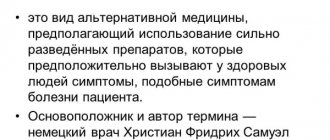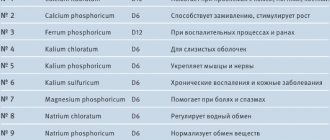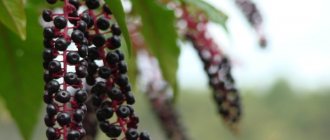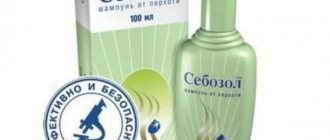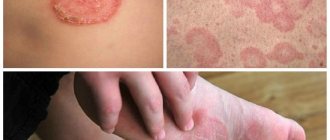Release form and chemical composition
This preparation is available in the following forms: ointment for external use, drops in potencies D3, C3, C6 and higher, and granules for oral administration in potencies D3, C3, C6 and higher.
The active ingredient of the ointment is Konium D1 tincture, and the auxiliary components are medical petroleum jelly, as well as anhydrous lanolin.
The spotted hemlock plant has the following chemical composition:
- coniine;
- conhydrin;
- pseudo-conhydrin;
- g-coniceine;
- methylkoniine;
- quercetin;
- kaempferol.
Description of the plant
Spotted hemlock is a biennial plant that can reach up to two meters in height. It got its name because of the toxic effect it has on the body. In the first year, hemlock looks simply like a bunch of basal leaves, which an inexperienced person or child can easily confuse with parsley or carrot tops. This may cause poisoning. The first symptoms of intoxication due to poisoning are dizziness and headache. In the second year of growth, the plant develops a stem. It becomes hollow and branched, acquires a bluish tint, and dark red spots appear at the bottom of the stem. The flowers are small, white, arranged in complex umbrellas. The fruit is an achene. The plant grows in many regions, with the exception of the Far North.
History of use in medicine and homeopathy
The first mention of hemlock as a medicinal product dates back to the 5th century BC. It was used in the treatment of many diseases. At the same time, it was considered one of the most powerful narcotic plants. As an anesthetic, as well as for scrofula, glandular tumors, and cancer, 0.2-0.3 grams were taken, but due to too frequent cases of poisoning, the drug was banned in traditional medicine.
The drug was introduced into homeopathic practice in 1825 by Hahnemann, who twice tested its effectiveness. He described the results of the first experiment in his work “Pure Medicine”, and the second in his work “Chronic Diseases”. Hahnemann showed interest in the plant because the Austrian physician Sterk described cases of complete recovery of patients suffering from severe forms of illness. Hahnemann used hemlock in small dilutions and obtained positive results. This experience underlies the modern principles of using the drug "Conium".
The development of the drug is based on Hahnemann's experiments and medical research for side effects. The drug has a complete effect on the entire body. In homeopathy, it is classified as a constitutional substance that is used in the treatment of chronic diseases.
In ancient Russian and English folk medicine, this plant was used for a variety of tumor processes: both for internal and external use. Oncologists are showing increased interest in this plant these days, as they see in it prospects for creating drugs that will promote the resorption of tumors and other neoplasms.
Tests have shown that after taking Conium, patients experience the following symptoms:
- weakness in the lower extremities;
- a feeling of dizziness when the patient watches a moving object or turns his head while lying down;
- pain in the left lung (in the upper part);
- feeling as if a lump or ball has formed in the larynx, which causes swallowing.
Hemlock is a fairly common plant and can be found in most European countries, as well as Western Siberia, Africa and Iran. A distinctive feature of the plant is dark red spots on the lower part of the stem (apparently, this is what gave it the name “spotted”).
Conium (Conium) Mix_MM
Description of the homeopathic drug Conium (Conium maculatum)
Vithoulkas
Conium maculatum - Spotted hemlock
Weakness progressing to paralysis Glands hard as stone. Tumors. In the consciousness, in the brain, there is a feeling that there are also “areas of compaction”: it gets stuck on something and cannot move. In Greece there is an expression: “callus (stones) in the head.” An idea that a person does not part with progresses into an obsession. Fixed ideas can reach the point of obsessive-compulsive neurosis. Superstitious: “if I take off my trousers, but at that moment a car passes on the street, then I need to put my trousers back on.” “I can’t go there because such-and-such, or here because such-and-such.”
In the emotional sulfur there is also “paralysis, compaction”: there are spheres that do not move at all. There are emotions that freeze, and he does not express them. They are unemotional and uncommunicative.
Causes weakness, tremor, trembling, paralysis at the emotional and physical (if hormonal activity is suppressed) level. This is a very materialistic person who constantly has to give vent to his sex hormones. If hormones are not released and the hormonal system is blocked, problems begin. They are very sexual, they need regular sex, 2-3 times a day when they are young.
If a woman loses her husband at the age of 55-60, but she is accustomed to a certain rhythm of sexual life with him, then with the loss of sex she will first experience some lethargy, drowsiness, confusion in the head, gradually progressing to dizziness (when turning in bed, standing up and etc. dizziness worsens, a slight movement - and “the whole room is shaking”). At the same time, she cannot start a new relationship, since, being an uncommunicative person, she gets used to a single sexual partner. These women suffer from tumors, especially in the genitals.
When sexual desire is suppressed, the following develop: lumps, tumors in the glands of the reproductive system, more often in the mammary glands in women, in the prostate (swollen hard prostate) in men, which can become malignant + confusion in the head.
Complaints: swollen, hard, painful gonads + “my head is never clear” Conium most often does not give way to its normal sexual needs. They seem to deny the need for sexual release, pushing it out of consciousness for some reason. For example, a wife denies her husband sex, as a result of which his prostate progressively increases in size, hurts, hardens, and his head becomes less and less clear.
Ascending paralysis, the head is never clear.
Tremor, primarily of the lower extremities, sometimes also of the upper extremities.
But Conium is not indicated for Parkinson’s disease, since it does not have an intense tremor, but an adynamic tremor - from weakness - the legs give way from weakness and tremble (thin, fine tremors)
Urination starts and stops, starts and stops, i.e. it takes 3-4 stages to urinate. Same with menstruation (during menopause??).
With bronchitis, he lies down and coughs and coughs until he gets up or sits down, or until at least a drop of mucous sputum comes out.
Question: if a teenager needs masturbation, but suppresses and controls himself. Is it the suppression that causes the symptoms - Is it Conium? And what is better to control yourself or give yourself a way out?
Vithoulkas: If you can control yourself, better control yourself.
But if it produces Conium-type symptoms, give Conium and you will help the patient. But this is rare, because... young people rarely have any side effects from suppressing sexual desire. It is ideal for a young man to restrain himself until he finds himself a wife.
Sweats heavily during sleep. Worse: when looking at moving objects, from alcohol, after physical exertion, old age, at night, from eating bread, closing the eyes, from abstinence
Better: Dangling the affected limb, From movement, In the dark, From pressure, Walks bent over Wants: salt, sour, coffee
Conium maculatum Hemlock mottled (spotted)
Mental: SUPERSTITIONAL. Obsessions. Materialist, practical, business type. There is no desire to do business or study, there is no interest in anything. Weak memory. Emotions are paralyzed. Excitement causes depression. Sad and gloomy. Afraid of being alone, but still avoids society.
Physical: Affects NERVES and MUSCLES. TREMBLING of the limbs. GRADUALLY ACCOMPANYING PARALYSIS and DENSIFICATION (INDURATION) of tissues. It affects the BREAST GLANDS and causes formations in them that are HARD like a STONE (seals). Severe soreness in the breasts. Used to ELIMINATE THE HARMFUL CONSEQUENCES OF SUPPRESSION OF SEXUAL DESIRE or excessive indulgence of this desire. PROSTATITIS or diseases of the UTERUS - DISCHARGE IS INTERRUPTED, then appears again. Dry and hacking continuous COUGH, worse (<) lying down, must sit up. Profuse sweat during sleep. Modalities: WORSE; when looking at moving objects; from alcohol; after stress; in old age, at night and from sexual abstinence; of bread; when he closes his eyes. IMPROVEMENT: When the affected part hangs down. From movement, darkness, pressure. When he walks bent over. DESIRE: salt, sour, coffee.
Berwick
Conium is an excellent remedy for such conditions as disturbances in gait, trembling, sudden loss of strength while walking, painful stiffness of the legs, etc. Such conditions are often found in old people - periods of weakness, lethargy, local congestions and slowness. These and other specific symptoms are indications for the use of Conium. They correspond to states of weakness, hypochondria; urinary disorders; weakening of memory; sexual weakness.
Disorders caused by lifestyle changes in bachelors and spinsters. The growth of tumors is also an indication for the use of this remedy. The general condition of the patient is as if he had been severely beaten. Considerable weakness in the morning in bed. Physical and mental weakness, trembling, rapid heartbeat.
Cancer diathesis. Arteriosclerosis. Caries of the sternum. Enlarged lymph nodes: affects the glands of the body, causing them to become full, swollen, and then indurate and change their structure, as happens in scrofulous and cancerous conditions. Tonic after the flu. Insomnia with polyneuritis.
Psyche. Excitement, which ultimately leads to mental and emotional depression. Depressed, timid, avoids society, but is afraid to be alone. Has no desire to work or study, cannot do anything. Memory is weak: cannot say anything.
Head. Dizziness when going to bed, when turning over in bed, when turning your head to the side or squinting your eyes, especially on the left; worse from shaking the head, from the slightest noise or from others talking. Headaches to the point of confusion, with nausea and vomiting of mucus, as if there were some foreign body under the skull. Feeling of heat on top of head. Feeling of tight compression of the head in the temple area; worse after eating (Gels.; Atropine.). One-sided pain, as from bruises. Dull occipital pain on rising in the morning.
Eyes. Photophobia and severe lacrimation. Pustules on the cornea. Blurred vision; worse in artificial light. Sweats when closing eyes. Paralysis of the oculomotor muscles (Caust.). Superficial inflammation of the cornea such as phlyctenous conjunctivitis and keratitis. The slightest ulceration or abrasion on the cornea causes severe photophobia.
Ears. Hearing loss; bloody discharge from the ear.
Nose. Bleeds easily and becomes painful easily. Polyps.
Stomach. Pain in the root of the tongue. Terrible nausea, sour heartburn and sour belching; worse on going to bed. Painful stomach cramps. Better by eating and then worse a few hours after eating; acidity and burning sensation; painful point at the level of the sternum.
Stomach. Severe pain in the liver itself and around. Chronic jaundice and pain in the right hypochondrium. Painful sensitivity, feeling of bruising, swelling, “dagger” pain. Painful lump. Chair. Frequent and persistent urges; hard with tenesmus. Weakness with trembling after every stool (Verat.; Ars.; Arg. n.). Heat and burning in the rectum during stool. Urinary system. Very difficult urination. The stream is interrupted (Ledum.). Intermittent urination (Clematis.). Drops of urine in old people (Copaiva).
Male genital organs. Increased desire, but reduced potency. Sexual neurasthenia with weakness of erections. Effects of suppressing sexual desire. Testicles are hard and enlarged.
Female genital organs. Dysmenorrhea with drawing down along thighs. The mammary glands are drooping and wrinkled, hard, painful to the touch. Stitching pains in nipples. The desire to squeeze the breasts more tightly with your hands. Menstruation late and scanty; sensitivity of the external genitalia. The mammary glands become enlarged and painful before and during menstruation (Calc. c.; Lac can.). Rash before menstruation. Itching in the external genital area. Unreadiness to conceive. Induration of the uterine pharynx and cervix. Ovariitis; enlarged ovaries with hardening; shooting pains. A painful condition after suppression of sexual desire or interruption of menstruation, as well as from sexual excesses. Leukorrhea after urination.
Respiratory organs. Dry cough - almost constant coughing; worse in evening and at night; caused by the presence of dry spots in the larynx with itching in the chest and pharynx, when lying down, when talking or laughing and during pregnancy. Expectoration only after prolonged cough. Chokes at the slightest effort; respiratory depression and chest compression; chest pain. Back. Back pain between the shoulders. Consequences of bruises of the back and spine. Coccydynia. Dull pain in the lumbar and sacral region.
Limbs. Severe, weak, paralyzed; trembling; numbness of fingers and toes. Muscle weakness, especially of the lower extremities. Hands sweat a lot. The pain is relieved when the feet are placed on an elevation - on a chair, etc.
Leather. Soreness of the axillary nodes with a feeling of numbness along the arm. Hardening after injury. Yellow discoloration of the skin with a papular rash: yellow nails. Lymph nodes (cutaneous and mesenteric) are enlarged and hardened. Stitching pains through the glands. Tumors with piercing pain; worse at night. Chronic ulcers with offensive discharge. Sweats heavily while sleeping or even just closing your eyes. Night and morning sweats with foul odor and burning of the skin.
MODALITIES. Worse when lying in a horizontal position; when turning over in bed or getting out of bed; under the influence of sexual abstinence; before and during menstruation; for colds; from physical or mental effort. Better by abstaining from eating; In the dark; when you can hang your limbs down; from movement and pressure.
RELATIONSHIPS. Similar: Baryt.; Hydrast.; Iod.; Kali phos.; Hyos.; Curare. Compare: Scirrhinum (cancer nosode). Cancer diathesis; enlarged glands; mammary cancer; worms.
BREEDING. It is better in high dilutions, which are not given often - especially in cases of neoplasms and paresis. And in other cases - from six to thirty.
Boger
CONIUM AREA OF INFLUENCE NERVOUS SYSTEM, MUSCLES. MAIRY GLANDS; ovaries. Genital organs. Breath.
IT'S WORSE WHEN LOOKING AT MOVING OBJECTS FROM ALCOHOL. When he raises his hands. After tension. Due to injury. At night. Because of sexual excesses. By cold; colds. From abstinence. In old age. Lying down; with his head bowed low.
BETTER When the diseased part of the body hangs down.
Irregular, disorderly manifestations ending in increasing WEAKNESS, as in old age; clothes are in the way, the person faints during bowel movements, has difficulty pronouncing words, has an unsteady gait, etc. Trembling, shaking; looks old. Chronic course. Early aging, decrepitude. Cachexia. Paralysis. sudden lightheadedness or weakness; with numbness.
SEALINGS: SOLID ORGANS, STONE [STONEY DENSITY}. Like a lump, a block: in the brain, in the epigastrium. Neoplasms. Compaction, hardening of blood vessels.
Ascending symptoms: They spread from bottom to top. Tearing pain. Stabs like a dagger.
Slow. Lethargic, apathetic. Shy, but afraid to be alone.
Weak memory. Unable to think after visual stress.
Dizziness, rotational [systemic]; when lying down, when turning in bed, from the slightest movement of the eyes or head, etc.:
It seems that the eyes are slanted towards the nose; the eyelids are heavy and drooping, especially in the outer corners of the eyes. Photophobia, photophobia. Color vision, chromatopsia [everything is painted in some color or colored spots before the eyes - N.L.].
Earwax is soft and friable. Acidic saliva. Intestinal gases are cold. Constipation: stool every other day. The stream of urine is interrupted, urine flows out in jerks, it is better to urinate while standing. The testicles are enlarged. Pains: when releasing sperm, ejaculation; in the ovaries, etc. Leaking prostate juice, prostatorrhea; worse during stool, from emotions, ejaculation, emission - from simple touch.
Menstruation is irregular. Acrid leucorrhoea.
A painful cough due to a sensation of a dry area in the larynx; due to tickling, soreness in the jugular fossa;
Heartbeat; worse from exertion, from drinking, during stool, etc.
GLANDS ARE HARD AND PAINFUL. Mammary glands: nodes on them; tingling; they get drunk before menstruation; wrinkled [atrophied]; they have too much milk; worse before menses or with every step.
Hot areas on the head. Spinal cord injuries. Heels: as if they would come out; shooting pain in them. The skin is greenish, like an old bruise; there are spots on it; foul-smelling rashes or eczema. Stupidity, stupidity. Feeling of coldness in the back of the head, calves, etc. Flashes of heat or sweat when falling asleep. Sweating under the eyes on the chin, in the popliteal fossa; cold sweat on the back of the neck or on the palms of the hands.
The minimum duration of action is 3 weeks. complementary. PHOS., Sii. diff. diagnosis. Am., Bar-c, Calc-f., Caust, Gels., lod.[/su_spoiler]
Grangeorge
A person who climbs a mountain and has a problem because he wants to take everything on the way at once (for example, an allopathic doctor takes everything at once: herbal medicine, acupuncture, nutritional supplements, Tien Shi, etc.), but he does not achieve the goal, falls into sexuality.
Happening. One doctor could no longer walk. We stopped by his house several times to do something nice. He looked at all the girls with passion, asked what their names were. They called him "the old shell." One day he called: “I’ve lost one ear.” D. Grangeorge quickly came to his house. He had a sulfur plug. Remove it for better hearing - one medicine = Conium. I gave him this medicine. Everything became fine, he began to walk (the medicine also worked on his paralysis, he is 85 years old), and began to study foreign languages. First, the Italian one went there, then the German one went to Germany, then the Spanish one went to Spain.
This medicine is also good to prescribe for learning foreign languages. These are people who speak all languages well. If a child has difficulty learning languages, he should be given Conium (15 or 30 CH). If you have problems with mathematics - Baryta carbonica, with literature - Fluoricum Acidum.
Happening. The dog is 8 years old, D. Grangeorge brought it from Africa (Conium). Working in Africa with a small society – a small population. They couldn't write, they only talked, but they were very spiritual. He named the dog Zhek (and they thought it was Chief), so they fed him from the plates of people at the table, no one touched him. He was very domineering - even the big dog left, and he ate from two plates. Wandered, left home for 5 days. Once he returned wet, lethargic, lay down in his basket (after a problem with female dogs), the next day he was paralyzed. I took him to the veterinarian - he said that it was old age, he did not need to be treated, but should be euthanized. I picked him up and took him to another veterinarian. He examined and discovered an enlarged prostate gland. He scheduled an operation. I also took it from this veterinarian and took it to a homeopathic veterinarian. Increased humidity and increased dictatorship - prescribed Conium 9 CH 3 grains = everything became normal and he still lived up to 16 years.
Happening. My grandmother had paralysis of her legs and rode in a stroller. She is very domineering and pedantic by nature. He gave her Conium 30 CH, and he took care of this grandmother’s child. A year later, she had already learned to walk, but she became strange: every morning she takes the Bible and walks around all the apartments and reads the Bible to everyone. She became a prophet.
Conium (Conium) - he is a prophet or very sexy. Like the Rooster. Sacrifice the Rooster to medicine, otherwise the Rooster is Conium (because he goes to look for all the chickens, he will be a prophet in the morning). When something is important, the Rooster crows 3 times. The rooster is a symbol of Conium, it is consciousness. S. Hahnemann = The Rooster is a man who sacrificed himself to medicine. By listening to another person, we get to know ourselves. We also listen to the patient to understand the disease. S. Hahnemann said that even words need to be written down. He also has an aversion to sadness, since he cannot apply sadness to himself.
The homeopathic medicine Conium is also a premenstrual syndrome.
Vermeulen
CONIUM MACULATUM Spotted Hemlock NERVES.
MUSCLES. GLANDS [MAMMARY GLANDS; ovaries]. Genital organs. Breath. * RIGHT SIDE. Left-hand side. Worsening: When SEES MOVING OBJECTS. ALCOHOL. When he raises his hands. After tension. Damage (trauma). Night. Sexual excesses; masturbation. Cold; cold. Abstinence; celibacy. Old age. In a lying position; head low. When he turns over in bed. Rolling eyes. Light. While eating. Milk. Snowy air; frosty air. When it's worth it. MOVEMENT. Improvement: Hanging of a body part. Movement of the affected body part. PRESS. Starvation. Darkness. Walking. When he sits down. CONTINUING MOVEMENT. • - GRADUAL paralysis and weakness in combination with compactions: Mental: gradual weakening of memory; dulling of all senses. Emotional: indifference and firmness; a materialist with a strong attachment to the material world. Because of its materialism, Con. subsequently suffers from the loss of a sexual partner. Physical: lumps and tumors; cancerous lesions. P - Gradual paralysis with a SLOW onset and for most parts INSPECCABLE. “This gradual deterioration will only be reported after two or three visits, after they have truly experienced an increase in energy and an improvement in their general condition. It is usually only later, after taking Conium, that they see how limited, constrained they were and how much more freedom and spontaneity they now have.” P - “A small number of symptoms on the emotional level and a type of INTROVERSION. The patient is not outspoken... Insufficiency in the emotional and mental sphere, leading to weak emotional and mental expression. The extent of the patient's emotional and mental response is not proportional to what you would expect from his history. You can see that this patient has suffered a lot emotionally in the past. You will see that in the past this patient has shown much stronger expression of emotions than at the present moment.” P - “Gradual WITHDRAWAL IN YOURSELF, ultimately leading to isolation and even AVOIDANCE FOR COMPANY. The patient gradually becomes more and more isolated and yet does not complain of deficiency. P - “The type of people who are satisfied with their condition. They have and express less anxiety associated with the situation than they could, based on their existing premises. They may even exhibit a complete lack of anxiety when faced with an uncertain future or poor prognosis associated with their pathology. At the first interview, they may not consider themselves physically and emotionally ill, or even limited at these levels70. Most Conium patients pride themselves on their ability to be calm, balanced and organized, both internally and externally, when confronting an emotionally changing situation.” P - “Beneath the present picture of the remedy there are other more expressive remedies, such as Phosphorus, but in fact in most cases it is Tuberculinum... Conium is to Tuberculinum as Thuja is to Medorrhinum... The connection between cancer and tuberculinic disease or miasm . In Conium's past, you can see a "turbulent" life, which, however, becomes less intense with the development of Conium pathology. P _ “Lack of sexual desire... You usually hear that “sex is not the most important thing...” Most of the women who responded to Conium treatment were lesbians. They had all had failed relationships with men for some time in the past, and usually ended up becoming lesbians after that. They all say their sexual relationships with men were not enjoyable and use words like “painful” and “unpleasant” to describe them. Heterosexual women can have the same feelings.”* P - Strong attachment to the material world, slowly turning into indifference [especially due to sadness]: “Cares very little about things; makes useless purchases, loses them or spoils them” [Phatak]. P - DISGUST towards COMPANY or STRANGERS during MENSTRUATION. P - “GRIEF ends in the development of paralysis or dementia.” P - Aversion to LIGHT; better in the dark. Likes to wear dark clothes; dressed as if in mourning. Prefers dark colors, even just black. O - CONTINUING movement [3]. О -> PRESS [3]. after breakfast [2]. F - Dizziness & numbness or stiffness in the neck [outer throat]. F - Prostatitis or enlargement of the prostate gland & difficulty urinating [straining, intermittent urine stream, headache and sweating from straining]. F - Heavy, drooping eyelids, Share your interest!
Impact on the body
Taking Konium in small toxic doses leads to relaxation of the body, which borders on a loss of strength. The patient has difficulty maintaining balance and experiences deteriorating vision. At the same time, taking the drug does not affect consciousness in any way - it remains absolutely clear. But after some time the patient loses the ability to move. If the dose is increased, the patient will experience dizziness, as well as rapid breathing and heart palpitations.
In the case of a large dose that enters directly into the blood, the nervous system is excited. Then severe weakness is felt in the limbs - first in the lower, later in the upper. The pupils dilate, so much so that the patient loses the ability to see. At the final stage, paralysis of the muscles of the respiratory system occurs and, as a result, death.
The effect of strong doses of the drug was described above. Its effect on motor centers plays a key role. At the same time, experiments carried out with small dosages of the drug showed that Konium also affects the skin and glands. Also, it is worth noting that it affects the mammary glands, it promotes the resorption of tumors in them. The drug has a similar effect on the testicles and ovaries.
And, lastly, in pathogenesis one can find references to how Conium affects the larynx and its nerves. It provokes severe coughing attacks.
PHYSIOLOGICAL ACTION
Imbert-Gurbeir, in a series of essays published in 1875 in the journal "Medical Art", irrefutably proved that it was Conium maculatum
, and not another variety of hemlock, was given to Socrates and caused the death of the sage, of which we find an excellent description in Phaedo. These are pages that cannot be re-read without excitement. (See Kravkov. Pharmacology. Ed. 1911, p. 323, vol. 1.)
“Until then, almost all of us had enough strength to hold back tears; but seeing how he drank, and after he drank, we no longer controlled ourselves. Despite all my efforts, tears flowed in such a stream that I was forced to cover myself with my cloak; I was not mourning Socrates’ grief, but my own, at the thought that I was about to lose a friend. Crito could not hold back his tears and left before me...
...Meanwhile, Socrates, who was still walking, said that he felt heaviness in his legs, and lay down on his back, as the watchman ordered him. Then the latter approached Socrates, examined his feet and thighs, squeezed his foot tightly and asked if he felt. Socrates answered no. Then he squeezed his thighs and, rising higher, showed us how cold and numb the body was. He felt him again and said that only the cold reaches the heart, Socrates will die. The entire lower part of my stomach was already cold. Then, revealing himself (he was covered), Socrates said (these were his last words): “Crito, we owe a rooster to Aesculapius, do not forget to bring this gift. “This will be done,” replied Crito. “Won’t you tell us anything more?” - There was no answer, and a little later he made a convulsive movement. Then the watchman opened it completely; Socrates' gaze was motionless. Crito, seeing this, closed his mouth and eyes..."
Two thousand years later, Christison writes: “In various experiments made with a very strong alcoholic extract from fresh seeds, the only phenomena were paralysis, first of the voluntary muscles, then of the pectoral muscles, and lastly of the muscles of the diaphragm, paralytic asphyxia with slight convulsive jerking of the limbs.” .
The first results of weak toxic doses are felt half or three quarters of an hour after ingestion of the poison; they consist of a feeling of languor, relaxation, with a drop in muscle strength; the gait becomes unsteady, the knees become weak, and vision is blurred. At the same time, consciousness remains calm and clear, sensitivity is preserved; the impairment of motor ability disappeared an hour after the onset of all the above-described phenomena. As the dose increases, dizziness, precardiac anguish, palpitations, and increased breathing are observed.
Finally, with strong poisonous doses, excitation phenomena are initially observed, which do not occur when hemlock leaves or seeds are taken orally, but are observed only when the dose of poison suddenly penetrates the blood. Then follows a period of collapse: weakness of the lower extremities, making the gait sway, then first muscle strength in the arms is lost, and soon all possibility of voluntary movements disappears. Sensitivity progressively decreases. The pupils are dilated and motionless, and visual disturbances are observed. Finally, paralysis of the respiratory muscles leads to asphyxia and death.
This is the main action of Conium
in a strong dose; it acts on the motor centers, for which, as Harley puts it, it is a “true hypnotic.” The oculomotor nerve is severely affected: there are accommodation disorders with dizziness, ptosis, dilated pupils, and diplopia.
Experiments by homeopaths, carried out with weaker doses, taken over a long period of time, have undoubtedly proven its effect on the glands and skin.
Conium
has an almost specific effect on the mammary glands, dissolving tumors and swellings. Dunam speaks of the same effect on the ovaries and testicles.
When applied topically, Harley observed “a dry, scaly rash on the skin, in places crescent-shaped, and very severe irritation of the skin with a dark copper color, very similar to the irritation of leprosy.”
Pathogenesis also speaks of its effect on the larynx and laryngeal nerves, so often confirmed by practice that there is no doubt. This action is expressed in “a short, dry, almost continuous cough, worsening in bed.”
Indications for use
Conium ointment is prescribed for the following indications:
- the mammary gland is painful, swollen;
- fibrocystic mastopathy (exclusively benign);
- small cysts and painful lumps that have arisen in the mammary gland as a result of injury.
Granules are prescribed for the following indications:
- exudative diathesis;
- severe swelling of the arms and legs;
- acute inflammation of the spinal cord;
- burning headaches;
- paralysis;
- paresthesia;
- insomnia;
- prostatitis;
- paresis of the upper eyelids;
- convulsive reactions;
- trigeminal neuralgia;
- sclerosis of cerebral vessels.
The instructions for the drug indicate that bronchitis and cough are indications for the use of the drug Konium 6. It is recommended to take it even in case of severe sputum discharge or when attacks of painful coughing occur during sleep, which is accompanied by very deep breaths with wheezing.
At the same time, the drug has proven effectiveness in the treatment of facial neuralgia, the main symptom of which is pain in the infraorbital nerve, which intensifies at night.
Also, indications for use of the drug are:
- diseases of the gastrointestinal tract, accompanied by increased formation of hydrochloric acid;
- stomach cancer;
- benign neoplasms in the gastrointestinal tract.
At the same time, the drug has proven itself in the fight against a variety of ophthalmological diseases. It will be effective in the treatment of prostate diseases that occur against the background of problems with urination.
CHARACTERISTIC
Loss of strength in women during and after menopause, after acute illnesses.
Hardening of the glands - to the hardness of wood, mammary glands and testicles in persons predisposed to cancer; after a bruise or wound, hardening is sometimes accompanied by burning pain.
The mammary glands become enlarged and painful during each menstruation, worse when walking or the slightest shock.
Dizziness, especially when turning over in bed; with slight movement of the head or even the eyes; You must keep your head completely still. Dizziness when turning head to the left ( Colocynthis
); dizziness in old women suffering from diseases of the ovaries and uterus.
Weakness of the genital organs - the desire is preserved, but there is no possibility of satisfying it; erections are short-lived and stop during intercourse.
Intermittent flow of urine is very typical (prostate damage in old people).
Day and night sweats, as soon as he falls asleep or as soon as he closes his eyes.
Vomiting dark masses, “coffee grounds”, with intense pain.
Uncontrollable craving for salt with aversion to milk, which is poorly tolerated.
Pain. Various, in joints and muscles, almost always appear at rest and at night, decrease with movement.
For cancer of the mammary glands and other organs, pain Conium
burning, stabbing and shooting.
Chair. Constipation is always accompanied by tenesmus and weakness after bowel movements. Diarrhea is much more common; stools are cloudy, sometimes very liquid, often with frequent urges. They are accompanied by colic and large bloating. The stools are very offensive and the stool is sometimes involuntary during sleep; it is also accompanied by tenesmus. Conium
- a remedy for diarrhea in weak, trembling old people who sometimes suffer from urinary incontinence.
Menstruation is scanty, delayed, short-lived, suppressed, with small red pimples all over the body. Amenorrhea after a cold, after putting hands in cold water. Leucorrhea like milk, thick, corrosive.
Conium type patient
A patient who belongs to the constitutional type of Conium is most likely an old man who cannot walk quickly. His gait can be described as shaking. At the same time, patients complain of unbearable weakness when walking and problems with the limbs. We can say that this drug corresponds to all diseases that are characteristic of older people.
A Conium type patient is a person experiencing a loss of strength, hypochondria, disorders of the genitourinary system, and memory impairment.
In addition, Konium is recommended for use by patients who suffer from cancer or scrofula.
Contraindications
According to the annotation for the drug, the use of Konium is contraindicated in the presence of hypersensitivity to any of its components, as well as in children and adolescents under 18 years of age.
During pregnancy, Conium is prescribed only if the expected benefits to the woman outweigh the potential risks to her child. If treatment is indicated during lactation, breastfeeding should be discontinued.
Conium is prescribed, but with great caution and under constant medical supervision to patients with gastritis, ulcers and stomach cancer, if they are accompanied by cutting, burning and/or stabbing pains.
Method of administration and dosage
It is recommended to apply Konium ointment to the skin in a thin layer immediately before bedtime. It is advisable to apply a bandage over it. This is how the ointment is used during the first week. Then move on to 2-3 applications per week. The course of treatment is 2-3 months.
The granules are taken sublingually (under the tongue). The standard daily dose is 40 granules (5 doses of 8 granules each). The course of treatment is one month. If necessary, the course can be taken again, but only after a break.
The dosage of the drug is determined solely by the attending physician based on the severity of the disease, as well as many other aspects that are not taken into account in traditional medicine.
Adverse reactions
In general, if the dosage is observed, the drug is well tolerated. However, in case of individual intolerance, dermatitis may occur when using the ointment, and allergies may occur when taking granules.
In addition, in rare cases, a decrease in blood pressure may occur. The following symptoms are extremely rare:
- nausea;
- diarrhea;
- vomit;
- dizziness;
- suffocation;
- numbness;
- tachycardia;
- fainting.
If any adverse reactions occur, it is recommended to immediately stop taking the drug and consult your doctor.
Side effects
If you follow the dosage, the product is well tolerated. Dermatitis can develop from the ointment, and an allergic reaction when consuming granules. Blood pressure may also decrease. Symptoms of intoxication if the dose is exceeded are possible: nausea, vomiting, diarrhea, dizziness, suffocation, tachycardia, numbness, loss of consciousness.
If any negative reactions occur, it is better to stop using. Regardless of the indications for use of the “Conium” (homeopathy) product.
